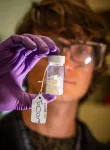(Press-News.org)
Alcohol-associated liver disease accounts for 50% of liver-related deaths, and its rates are rising worldwide. But one of the best treatment options, early liver transplantation (ELT)—transplants done with no mandatory period of abstinence from alcohol—is also one of the most controversial, partly because of concerns that patients will relapse to alcohol after transplantation.
Part of the problem is that livers for transplants are in short supply, and researchers lack data to determine who will benefit most from ELT. Studies show that decisions about who gets a transplant can, at times, be influenced by bias or unsystematic. The result is that many patients lack access to life-saving care, while others continue to have poor health even after getting a transplant.
“There are significant knowledge gaps that contribute to disparities in access to transplant, as well as post-transplant outcomes,” said Brian P. Lee, MD, assistant professor of clinical medicine in gastrointestinal liver diseases at the Keck School of Medicine of USC. “Early transplant for alcohol-associated liver disease is now the fastest-growing reason for liver transplants, so there’s a real urgent need for more data.”
To that end, Lee and his collaborators have just received $12 million from the National Institutes of Health for a seven-year study of ELT. Lee, his co-principal investigator, Norah Terrault, MD, professor of medicine, chief of the Division of GI and Liver and Neil Kaplowitz Chair in Liver Diseases at the Keck School of Medicine, and their collaborators will recruit participants from nine sites across the country through their ACCELERATE consortium.
The team will then collect a broad range of data, including audio recordings that document how patients are selected for ELT, information about patient outcomes, and biological samples that will be used to create a repository of data on alcohol and liver health. By the end of the funding period, the researchers aim to understand how to offer ELT fairly and effectively, both based on patient characteristics and through a more systematic approach to selection.
“Our goal is to help stem an epidemic of alcohol-associated liver disease and to provide our patient community with better treatment options,” Lee said.
Overcoming health disparities
Decisions about who receives an organ transplant are not always fair. Studies show that factors such as race, socioeconomic status and insurance type (public versus private) impact both transplant access and health outcomes following the operation.
Lee and his colleagues are taking a close look at the selection process to get a better sense of where bias enters the equation. First, they’re comparing socioeconomic status—based on a patient’s home address—to transplant selection decisions. They’re also collecting audio recordings during the transplant selection process to determine key factors influencing selection decisions. The insights they gain can aid in the development of best practices and checklists to reduce systematic bias. At the patient level, they’re analyzing data on insurance type, income and other social determinants of health.
Patients will be recruited at nine sites across the country from a variety of demographic groups, ensuring diversity of gender, age, race/ethnicity, education level, income level and geographic region that reflects the full scope of patients who receive liver transplants. At the Keck School of Medicine, the majority Hispanic patient population provides a unique opportunity to study how best to serve a group traditionally underrepresented in medical research, Lee said.
Building a biorepository
In addition to analyzing the selection process, the researchers will collect data on what happens after selection, with the goal of improving transplant outcomes for patients. After a transplant, what factors predict alcohol relapse and what factors predict survival? What therapies are most effective for preventing and treating alcohol relapse? Do patients develop cardiovascular problems, cancer or other conditions?
Patient surveys about quality of life, alcohol use and access to care, as well as biological material (radiology results, blood and microbiome samples, liver tissue and other data) will also be collected throughout the course of the study and stored in a shared biorepository. With patient permission, other scientists can use the samples for future research on ELT and beyond, including studies of alcohol-associated hepatitis, alcohol use disorder and liver health.
About this research
In addition to Lee and Terrault, Wendy Mack, Jennifer Dodge, Aaron Ahearn and Myles Cockburn are collaborators on the project. Chanita Hughes-Halbert is a consultant.
This work is supported by the National Institutes of Health [NIH R01AA030960].
About Keck School of Medicine of USC
Founded in 1885, the Keck School of Medicine of USC is one of the nation’s leading medical institutions, known for innovative patient care, scientific discovery, education and community service. Medical and graduate students work closely with world-renowned faculty and receive hands-on training in one of the nation’s most diverse communities. They participate in cutting-edge research as they develop into tomorrow’s health leaders. The Keck School faculty are key participants in training of 1200 resident physicians across 70 specialty and subspecialty programs, thus playing a major role in the education of physicians practicing in Southern California.
END
An examination of the SCALE-UP Counts program was recently published in the journal Pediatrics. This analysis, led by Yelena Wu, PhD, investigator at Huntsman Cancer Institute and associate professor in the department of dermatology at the University of Utah (the U), and David Wetter, PhD, MS, investigator at Huntsman Cancer Institute and professor in the department of population health sciences at the U, received support from RADx-Underserved Populations (RADx-UP) and funding from the National Institute of Health (NIH).
The SCALE-UP Counts program was designed to promote COVID-19 testing through collaboration ...
At a time of nature crisis driven by unparalleled rates of biodiversity loss, a new interconnected system to monitor biodiversity around the world is urgently needed to direct and focus conservation action.
"The lethal combination of habitat loss, the exploitation of natural populations, pollution, and climate change is causing species extinction rates not seen since the last mass extinction 65 million years ago," said Prof. Andrew Gonzalez, Liber Ero Chair in Conservation Biology at McGill University, and co-Chair of GEO BON. "We lack the means to monitor these impacts ...
MINNEAPOLIS/ST. PAUL (08/24/2023) — Researchers from the University of Minnesota Medical School and College of Pharmacy have found that high costs for hepatic encephalopathy treatment in patients with end-stage liver disease were associated with decreased treatment retention for patients. The study results were recently published in Hepatology Communications.
Hepatic encephalopathy is the loss of brain function that occurs in people with severe liver disease. The condition is associated with high morbidity and mortality. ...
MINNEAPOLIS/ST. PAUL (08/24/2023) —Lung cancer is the deadliest cancer in the United States, and 80% of lung cancer deaths are linked to one risk factor: smoking. While lung cancer screenings are a critical part of prevention and treatment for the disease and 15 million Americans qualify for yearly screenings, over half those eligible for screenings are still actively smoking. Without standard smoking cessation measures in place, the benefits of the screenings have not been fully realized.
New ...
A new approach to quantum light emitters generates a stream of circularly polarized single photons, or particles of light, that may be useful for a range of quantum information and communication applications. A Los Alamos National Laboratory team stacked two different, atomically thin materials to realize this chiral quantum light source.
“Our research shows that it is possible for a monolayer semiconductor to emit circularly polarized light without the help of an external magnetic field,” ...
ALBUQUERQUE, N.M. — A team at Sandia National Laboratories developed a molecule that helps change the way some materials react to temperature fluctuations, which makes them more durable. It’s an application that could be used in everything from plastic phone cases to missiles.
Polymers, which include various forms of plastics, are made up of many smaller molecules, bonded together. This bond makes them especially strong and an ideal product to be used to protect delicate components in a wide variety of items. But with time, use and exposure to different environments, all materials begin to deteriorate.
Hot ...
Woods Hole, Mass. (August 23, 2023) -- Scientific exploration of the deep ocean has largely remained inaccessible to most people because of barriers to access due to infrastructure, training, and physical ability requirements for at-sea oceanographic research.
Now, a new and innovative framework for oceanographic research provides a way for shore-based scientists, citizen scientists, and the general public to seamlessly observe and control robotic sampling processes.
The Shared Autonomy for Remote Collaboration (SHARC) framework “enables remote participants to conduct shipboard operations and control ...
ROCHESTER, Minnesota — Pre-eclampsia, a life-threatening surge in blood pressure, is an enigmatic condition. Each year, it causes the deaths of more than 70,000 women worldwide. Because scientists do not know what causes it, they lack targeted strategies to treat it.
Delivery, the only available therapy, is not the cure it is often made out to be, according to Vesna D. Garovic, M.D., Ph.D., a nephrologist at Mayo Clinic in Rochester, Minnesota, who has devoted her career to studying this common pregnancy complication.
"Even after delivery, women ...
URBANA, Ill. — A new analysis from the University of Illinois Urbana-Champaign and the USDA-Agricultural Research Service (ARS) has identified the top factors accounting for yield variability in processing sweet corn (used for canned and frozen products), including one within the control of processors.
“We used a very robust approach to account for sweet corn yield with field-level data across some 16,000 fields and 27 years. Year and production region were the two most important variables, which makes ...
Scientists have created a new test for identifying people at risk of developing acute myeloid leukaemia and related cancers, years before they do. The new platform, ‘MN-predict’, will allow doctors and scientists to identify those at risk and to design new treatments to prevent them from developing these potentially lethal cancers.
Researchers at the Wellcome-MRC Cambridge Stem Cell Institute (CSCI), the University of Cambridge’s Department of Haematology, and Instituto de Investigación Sanitaria del Principado de Asturias (ISPA) analysed data from more than 400,000 individuals participating ...




